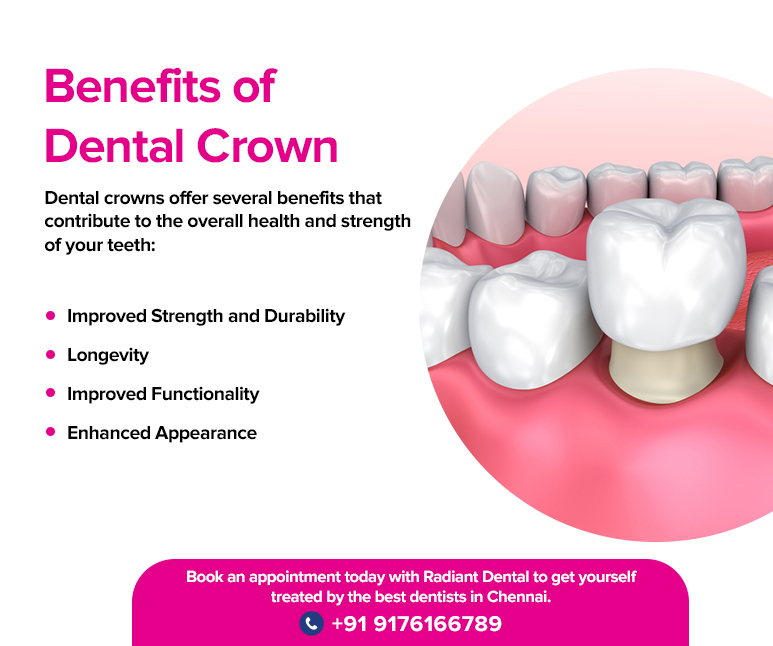Understanding the Roles and Benefits of Dental Crowns for Stronger Teeth

Your teeth play a vital role in your overall health and well-being, enabling you to chew and enjoy your favorite foods and beverages. However, sometimes, teeth can become damaged, decayed, or weakened, compromising their strength and function. In such cases, dental crowns can be an excellent solution to restore and protect your teeth. These tooth-shaped caps are designed to cover and strengthen your natural teeth, providing both functional and aesthetic benefits.
By understanding the roles and benefits of dental crowns, you can make an informed decision about protecting and preserving your smile for years to come.
Roles of Crowns
Dental crowns serve several important roles in protecting and preserving your natural teeth. Here are some of the primary roles of crowns:
- Protecting Weak Teeth: When a tooth is severely damaged, decayed, or weakened, a crown acts as a protective shell, preventing further damage and holding the remaining tooth structure together.
- Restoring Broken or Worn Teeth: Teeth that are broken, cracked, or worn down due to grinding or other factors can be restored with a dental crown. The crown covers the remaining tooth structure and provides a new, strong outer surface.
- Supporting Dental Bridges: Crowns are used to anchor dental bridges, which are false teeth used to replace missing teeth. The crowns are placed on the teeth adjacent to the gap, and the bridge is attached to these crowns, spanning the space.
- Enhancing Aesthetics: Crowns can also be used for cosmetic purposes, such as improving the appearance of discolored, misshapen, or misaligned teeth. Porcelain crowns can be custom-made to match the color and shape of your natural teeth, providing a seamless and attractive smile.
Benefits of Dental Crown
Dental crowns offer several benefits that contribute to the overall health and strength of your teeth:

- Improved Strength and Durability: Crowns are designed to withstand the forces of biting and chewing, providing greater strength and durability than your natural tooth enamel. This helps protect the underlying tooth structure from further damage.
- Longevity: With proper care and maintenance, dental crowns can last for many years, often a decade or more. This makes them a long-lasting solution for protecting and restoring your teeth.
- Improved Functionality: Crowns can help restore proper bite alignment and chewing function, allowing you to eat and speak more comfortably.
- Enhanced Appearance: Porcelain crowns are designed to mimic the natural appearance of your teeth, blending seamlessly with your smile. They can help improve the overall aesthetics of your smile and boost your confidence.
Dental Crown Maintenance
To ensure the longevity and effectiveness of your dental crowns, proper maintenance is essential. Here are some tips for maintaining your crowns:
- Practice Good Oral Hygiene: Brush twice daily with a soft-bristled toothbrush and floss once a day. Proper oral hygiene helps prevent decay and gum disease, which can compromise the integrity of your crowns.
- Avoid Hard or Sticky Foods: Crowns are strong, but they are not indestructible. Avoid biting down on hard objects like ice, nuts, or hard candies, and limit your consumption of sticky foods that can dislodge crowns.
- Visit Your Dentist Regularly: Regular dental check-ups and cleanings are crucial for monitoring the condition of your crowns and addressing any potential issues early on.
- Wear a Nightguard (If Recommended): If you grind or clench your teeth at night, your dentist may recommend wearing a nightguard to protect your crowns from excessive wear and damage.
By understanding the roles and benefits of dental crowns, as well as practicing proper maintenance, you can enjoy stronger, healthier teeth for years to come. If you suspect you may need a dental crown or have concerns about your existing crowns, consult with our best dentist in Chennai. We are here to help you with any oral health concerns you have. Book an appointment today to Radiant Dental Care know more or call us at +91 9176166789
FAQs
How long do dental crowns last?
Dental crowns are designed to be a long-lasting solution for protecting and restoring your teeth. With proper care and maintenance, crowns can typically last between 5 to 15 years. However, the lifespan of a crown can vary depending on factors such as the type of material used, your oral hygiene habits, and the amount of wear and tear it endures.
Are dental crowns expensive?
The cost of dental crowns can vary depending on the type of material used (such as porcelain or metal), the complexity of the procedure, and your geographic location. Generally, dental crowns are considered an investment in your oral health, as they can protect and preserve your natural teeth, preventing more extensive and costly treatments in the future.
Does getting a dental crown hurt?
Getting a dental crown typically involves minimal discomfort. Your dentist will numb the area around the tooth with a local anesthetic before preparing the tooth for the crown. You may experience some sensitivity or discomfort after the procedure, but this is usually manageable with over-the-counter pain medication.
Can you whiten a dental crown?
No, dental crowns cannot be whitened like natural teeth. Crowns are made of materials that are resistant to staining and discoloration, so they will not respond to teeth whitening treatments. If you’re concerned about the color of your crown, your dentist can replace it with a new one that better matches the shade of your surrounding teeth.
Can a dental crown fall off?
A dental crown can become loose or dislodged, although this is not common when the crown is properly fitted and cared for. Factors that can contribute to a loose crown include decay or damage to the underlying tooth, excessive force from grinding or clenching, or poor oral hygiene. If your crown becomes loose or falls off, it’s important to see your dentist promptly to have it re-cemented or replaced.

 +91 9513446186
+91 9513446186
